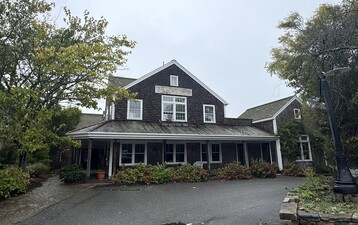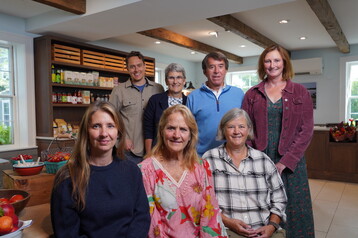Land Bank, Nourish Nantucket Negotiating Deal For A New Food Pantry Headquarters, Deer Processing Facility
JohnCarl McGrady •

The Nantucket Food Pantry may soon have a new, permanent home on Boynton Lane. After months of uncertainty surrounding the island nonprofit following the Town of Nantucket’s decision not to renew the Food Pantry’s lease at its current location on Washington Street, the Nantucket Land Bank and Nourish Nantucket have come together with the Food Pantry and are negotiating the “collaborative purchase” of 17, 19 and 21 Boynton Lane to create a unified food security hub that will include a permanent location for the Food Pantry.
The new facility would also include a deer processing facility, allowing for a far greater capacity to process donated meat from local hunters, and would serve as a base of operations for Nourish Nantucket.
The building at 17, 19, and 21 Boynton Lane has been owned by island resident Kim Reed since 2003, and is used as the headquarters for her catering business, A Taste of Nantucket. Before that, the property had been the home of the Peter Piper Market. Terms of the deal have not yet been disclosed.
“This partnership strengthens our ability to serve our neighbors,” said Rabbi Gary Bretton-Granatoor, President of the Nantucket Interfaith Council, which oversees the Food Pantry and Nantucket Food, Fuel, & Rental Assistance. “We are proud to join forces with the Land Bank and Nourish Nantucket in shaping a future where all Nantucketers have access to healthy, reliable food.”
Located centrally in the mid-island area, less than one-tenth of a mile from a bus stop, the Boynton Lane location comes with a commercial kitchen and meets many of the Food Pantry’s ideal specifications. The new location will allow the Food Pantry to expand, potentially serving more customers and reducing hunger on-island.
“This building represents more than a physical space, it represents our collective commitment to the well-being of our community,” said Rachael Freeman, director of the Land Bank. “By working together with Nourish Nantucket, the Food Pantry, and the Interfaith Council, we are ensuring that Nantucketers can rely on a strong, resilient, and compassionate food security network for generations to come.”

Founded in 1991, the Food Pantry has long been the face of food aid on Nantucket, providing a critical lifeline to thousands of Nantucket residents. The Food Pantry is now part of Nantucket Food, Fuel, and Rental Assistance, which, in turn, is run by the Nantucket Interfaith Council.
Even before the town had made clear that the Food Pantry would lose the Washington Street location to accommodate an expansion of the Nantucket Regional Transit Authority next spring, the Food Pantry had been searching for a more suitable location for its operations, somewhere less cramped that could allow for greater size and more dignity for customers.
Around one in five Nantucket residents struggles to afford food, and it’s not just the Food Pantry working to address the problem.
Nourish Nantucket, a much newer non-profit, is also working to address food insecurity on Nantucket. Nourish will use its space in the food security hub to advance its collaborative programming, including farmer partnerships and community meal initiatives, and anchor their broader vision for a sustainable local food system.
“This is a transformative step for the island,” said Brooke Mohr, Nourish Nantucket Board President. “We are grateful to the Land Bank for their extraordinary leadership and to the Food Pantry and Interfaith Council for working with us to build a shared vision for food security on Nantucket.
“This building strengthens Nourish Nantucket's ability to address the food challenges on the island and gives our donors confidence in our long-term future,” Nourish Nantucket creator Bruce Percelay said.
The food security hub will also include a custom butchery tailored for venison production, an initiative that has been rapidly gathering steam in recent months. The butchery concept has been recently pushed by the ACK Deer Management Project, and in theory would allow Nantucket to massively increase its involvement with the Massachusetts Department of Fisheries and Wildlife Hunters Share the Harvest program, through which hunters can donate venison to those in need. The Land Bank announced Tuesday that it was joining the program with the creation of the butchery tailored for venison production.
Past efforts to process deer for the program have been limited by the lack of a dedicated commercial facility and staff. The Land Bank’s efforts could change that. Essentially every major player in the island’s fight against food insecurity has spoken in favor of the program, which could provide as many as 75,000 meals for island residents every year.
Last year, island hunters took 863 deer. ACK Deer wants to leverage the Share the Harvest Program, and a commercial facility like the one proposed by the Land Bank, to get that number to 2,000. While even that won’t dramatically slash Nantucket’s deer population, reducing the island’s herd could have a number of positive impacts for Nantucket beyond fighting food insecurity.
Deer cause massive damage to local ecosystems, are notorious disease vectors, routinely prove a nuisance to local landscapers and gardeners, and are a danger to drivers. Unchecked, ACK Deer co-founder Mike Leavitt said, Nantucket’s deer could lay waste to the island’s forests, speed up erosion, and eventually begin to starve themselves to death.
And yet, the herd is only growing. The latest estimate from the state suggests there are 10,000 deer on Nantucket, and if nothing changes, that’s the floor. For reference, the state’s guidelines suggest that a healthy population of deer on Nantucket would be approximately one-tenth of the current population, at around 900 deer.
The state is doing what it can, expanding hunting seasons, offering unlimited hunting permits, and even raising the possibility of programs that would allow the controlled killing of deer outside of deer season.
But a facility like the one on Boynton Lane could be what is needed to turn the corner in Nantucket’s fight against deer overpopulation.
The purchase is an interesting move from the Land Bank, as the organization is purchasing non-conservation land that won’t be used for conservation purposes. Under its enabling legislation, the Land Bank can utilize the revenue it derives from the 2 percent transfer fee on real estate transactions for land dedicated to open space, recreation, or agricultural uses.
For over 40 years, the Nantucket Land Bank has been a steward of local agriculture, acquiring farmland to support island farm families and preserve Nantucket’s agricultural heritage,” the Land Bank wrote in a press release Tuesday. “Today, most of the island’s farms operate on Land Bank property, thanks to ongoing partnerships with tenant farmers and Sustainable Nantucket’s Mentor Farming Program.